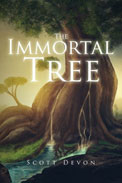
 |
In recent years, a common theme in the publishing world has been to revisit or reimagine the beliefs, myths, and fables of our past, to bring new life into these tales that have for so often seemed like moral companions to their readers. This book does this in its retelling of humanity's fall from grace—the story of Adam and Eve.
The book's focus is about two humans, the first to enter the fabled garden paradise, and their misadventures as they build a life for themselves. Life centers around a massive and strange King Dragon that governs over the garden paradise and a tree called Vivar upon which it grows prized fruit. The humans, James and Lilith, feel a pull towards the fruit, almost instinctively wanting to avoid the tree while simultaneously desiring to taste the fruit. Over time, they give birth to two very different sons, Jaaling and Kahn. One is peaceful and frustrates his parents due to his mild nature. The other is cunning, which concerns his family. The brooding and frustrated narrative within the relationships of the parents and children adds suspense to their exchanges. The mother is sick and is forced to eat the magical fruit to survive. This seems to alter the delicate structure of their lives forever, and similarly to Adam and Eve, provides the underlying conflict of the story.
The single family is a condensed version of many biblical themes and characters. Meanwhile, the Dragon King is the embodiment of the short and long-term choices each of them has to make. He is portrayed as separate from the family yet ever-present as he governs and protects them. This is a clever and intriguing read. It labors hard and successfully to modernize an important story of how people can be the cause of their own fates.